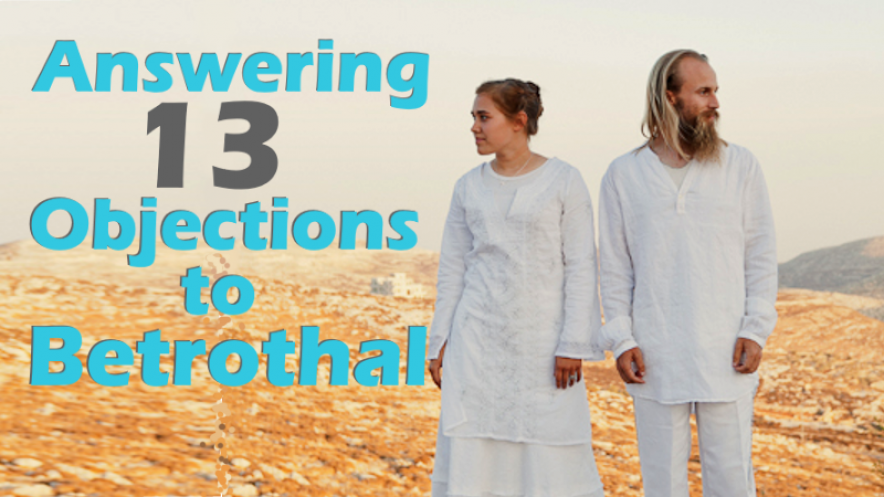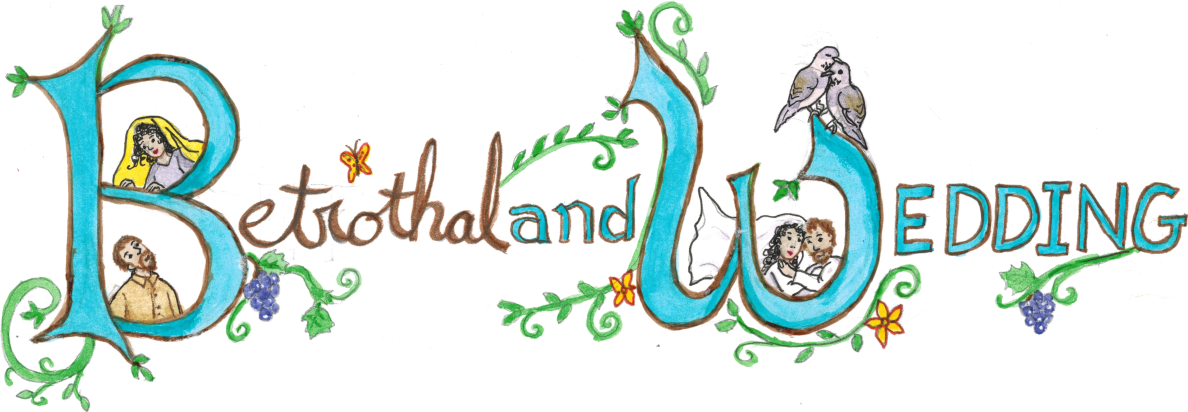
Here is a list of objections that we have encountered since we began teaching about betrothal. Each objection is in italics and is followed by our response.
1. Making a marriage covenant with someone you don’t know well is foolhardy. It is dangerous for a father to give his daughter or for a young woman to agree to such a match. The emotional trauma and baggage this would bring into marriage can be avoided by entering marriage in a wiser way.
Betrothal is indeed a covenant of marriage, a covenant that will eventually be consummated, but entering a covenant at the behest of Yahweh is never foolhardy! When Israel made an unadvised covenant with Gibeon, in Joshua chapter 9, the problem there is specified in verse 14 that “they did not inquire of Yahweh.” In Genesis 24 when Rebekah’s father and brother give her in marriage to Isaac (whom they had not met) and through an intermediary they just met that evening, they say, “The thing is of Yahweh.” It isn’t whether or not you “know someone well” that makes covenanting with them advisable. It is whether or not you know it is the will of Yahweh, which comes from talking to Him, not from getting to know the individual.
That being said, not everyone who gets betrothed barely know each other. A man I know married a family friend and they had known each other from the time they were 5-year-olds. In those decades of relationship before the betrothal, they treated each other as brother and sister. Only after the covenant was in place did they begin to hold hands and court each other’s affection. I mention this instance to demonstrate that practicing betrothal is about making covenant based on God’s will; how well you know the person is irrelevant.
2. In the prophets God woos Israel, alluring her to Himself, so courtship is biblical.
Yahweh speaks of alluring Israel within His covenant with her! It is during the time between the betrothal and the wedding that the wooing and alluring of Yahweh towards Israel takes place. In the similar picture of Yeshua wooing His bride, (ultimately the same bride) Yeshua has paid the bride price. (This shows that both the bride’s Father and the Groom have agreed upon the marriage.) So, I can see a case being made for a man to woo a woman to gain her commitment, as long as that man and the woman’s father have already reached full agreement. That being said, I believe that a wise woman, like Rebekah, would not be wooed into making her decision. Knowing Yahweh's will would be all she needs to make her decision and enter the covenant.
Wooing (or pleasing one’s spouse as Paul calls it in 1 Corinthians 7) definitely should happen during the betrothal and on throughout the marriage! But the type of emotional response that wooing is meant to inspire we should ideally reserve for our spouse, saving it until after we have entered covenant.
3. It is natural to desire marriage and the desire to be married to a certain person is not wrong as long as no immoral action is taken in pursuing that desire.
Desire for marriage in general is natural just like general sexual desire is natural, but when either of those desires are turned towards a particular person, there is a problem. Avoiding immoral action is good, but Yeshua teaches that immoral attitudes need to be kept in check as well. Pursuing marriage with someone because you “desire to be married to them” is still pursuing your own desire. Seeking and pursuing God’s will, and waiting until He gives us a spouse before we “turn on” our desire towards them, is a far better plan.
4. American engagement is the closest equivalent we have to betrothal in the Bible, the one exception being betrothal can only be called off for infidelity.
A betrothal could not just be “called off” for infidelity, it required a divorce to dissolve the covenant! Also, since the covenant was made at betrothal, a closer equivalent to the betrothal period is the timeframe between the marriage ceremony and the consummating of that marriage. The rare American couples who are sexually pure usually enter “betrothal” (by making their covenant) at the wedding ceremony and then are “betrothed” for only a few hours during their wedding reception, consummating the marriage (which ends the betrothal period) that night.
5. Scripture tells us to not to be unequally yoked, so making a life-long covenant with someone you don’t know is not wise.
Although people often quote only part of the verse in an attempt to biblically disqualify other candidates, the passage only directly warns us about not being “unequally yoked together with unbelievers.” Obeying God’s voice in who to marry is always the wise course, regardless of how well you know them. Rebekah was not foolish to recognize God had spoken and agree to be Isaac’s wife although she had never met him.
Getting betrothed without hearing from God would indeed be unwise! Similarly, it would be unwise to marry after dating or courting without asking God if it is His will. If I am being an obedient believer, I will not marry someone that God has told me not to marry no matter how well I know them or how qualified they are, and I will marry whoever God tells me to marry no matter how well I know them or how unqualified they are. When it comes down to it, God’s will is the only factor that matters. So why not start and end there instead of sprinkling in some “leaning on our own understanding” by evaluation and seeking chemistry in courting/dating?
6. Getting to know every young woman as a “sister in Christ” sounds like it hasn't been well thought out and would lead to unwanted relationships after marriage.
Maybe you are misunderstanding the type of relationship we are promoting as “brother and sister in Christ.” Whatever would be appropriate with your married brother’s wife is what is also appropriate with single women. The married woman and the single woman are equally your sister in Christ. In no way do true “brother and sister in Christ” relationships aim towards marriage relationships. Since every such relationship is “in all purity” with no hint of heading towards marriage based on the relationship, neither a first marriage, nor a second marriage should be expected to grow naturally out of the relationships. Rather, marriages come out of seeking and obeying God in who He tells you to covenant with.
7. Once a brother or sister has a covenanted marriage, there is less room for "brothers and sisters in Christ" relationships to remain moral.
Consider how the benefits of marriage work in other areas, the marriage bed being the most obvious. Singles do not have access to the bed with each other, that is not because they have pledged fidelity to someone else, but because the covenant being in place is what confers the benefits. A married man does not have less access to the bed with single women because of his covenant with his wife, that covenant only gives him more access to the marriage bed with his wife. Marriage does not restrict access to others, it grants access to your spouse.
This principle can be applied to “brother and sister in Christ” friendships. Singles don’t have “more room” for emotional intimacy in their friendships than the married do. All relationships before covenant should be at a level where a marriage by either party will not require that relationship to be reduced in intimacy. If a relationship with a “sister in Christ” has to be dialed back after you or she marries, then that relationship was beyond a “sister in all purity.” The problem is when people say they are “brother and sister” while doing things that should be reserved for marriage both before and after entering marriage.
8. It sounds like you are saying every wife is a good thing and that being married to a bad wife is better than being celibate, but the Bible says that a man’s bad wife is as “rottenness in his bones.”
It is also the Bible that says, “He who finds a wife finds a good thing,” (Proverbs 18:22) and “it is not good for man to be alone.” (Genesis 2:18) The verse you refer to, Proverbs 12:4 says, “A virtuous woman is a crown to her husband: but she that maketh ashamed is as rottenness in his bones.” Considering that the early chapters of Proverbs often contrast “the wife of your youth” against the “strange woman” there is a good chance here that the shameful woman that causes rottenness is the “strange woman” and not one’s own wife at all!
But even if it is the intent of the proverb to say that a bad wife is like rottenness in one’s bones, we have to be able to rectify these passages with each other. How can it be a good thing to have a wife that causes rottenness? The answer is that spiritual gain, say treasure in heaven, is worth sustaining physical loss. We are called to offer up our bodies as living sacrifices. When we look at marriage as an opportunity to give and serve instead of as an opportunity to better one’s own life, this all makes sense. I think we could safely say that Hosea’s wife Gomer brought him shame and as such was rottenness in his bones. Yet because Hosea was loving like God loves, he was laying up treasure in heaven. For Hosea, having a bad wife still weighs out as a good thing on the balances of eternity.
To clarify, we do not teach that having a bad wife is always better than being celibate. We teach that each man should be obedient to his calling and that for most men, marriage is part of that calling. We teach that men should only marry when and whom God tells them to - that seeking and obeying God’s will is paramount. Obedient celibacy is better than disobedient marriage, even to a virtuous wife. Obedient marriage, even to a bad wife, is better than disobedient celibacy.
9. Abraham’s servant used character evaluation to decide on a bride for Isaac, so that is the key in picking out who to marry.
The idea that Abraham’s servant looked at Rebekah’s character to make his selection is an errant teaching. The whole story is found in Genesis 24 and in verse 7 Abraham says that Yahweh will send His angel before the servant. In verses 12-14 the servant asks for a sign as to the woman that “Yahweh has appointed” for Isaac. In verse 21 he watches in silence to see if Yahweh had made his journey prosperous. In verse 27, the servant credits Yahweh with having led him to the right family. In the servant’s retelling in verses 34-49, he again credits Yahweh with the leading and with having “appointed” Rebekah “for my master’s son.” In verses 50-51, Bethuel and Laban acknowledge that the marriage is from Yahweh and that Yahweh has spoken. Then, one last time in verse 56, the servant again credits Yahweh with prospering his errand. The whole passage centers around how Yahweh picked Rebekah for Isaac and made it clear to Abraham, Abraham’s servant, and Rebekah’s guardians that He had spoken. Trying to turn this into a character evaluation story, steals the glory from God.
The servant’s prayer in particular makes it clear that his goal was to ascertain who Yahweh had chosen for Isaac, not do a character evaluation himself. It doesn’t make any sense to teach that a comprehensive character evaluation is what we should practice, based off the one test that the servant himself said was a sign to determine Yahweh’s will. Surely even those who teach character evaluation as the deciding factor would admit that witnessing one apparently selfless deed (done to an obviously rich man) is not enough to act upon.
10. God created us to be physically attracted to the opposite sex and aren't husbands told to love their wives? So if a young man said he thought my daughter was ugly but was asking for her because God had told him to, I would be just as concerned as I would be about another young man who admitted he was asking solely because he found her attractive.
Love is a choice, not a feeling and we are commanded to love even our enemies, so ugliness is no barrier to love. Basically, the first man says he is seeking to walk in God’s will regardless of the cost and the second man is saying that he is walking according to the desire of his eyes. There is no comparison here. The first man is in a far better place as a potential candidate. After all, physical beauty tends to fade and is called by scripture “vain,” so if the goal is a life-long marriage, at some point her physical beauty will be gone. A man who is ready to deal with that up front in order to follow God shows maturity and it would be reasonable to expect that he will be a faithful husband even as his wife’s physical beauty fades. The second man is asking to build a house on a foundation of sand.
11. We can’t tell young people that having a desire to marry a particular person of the opposite sex is falling into the lust of the flesh.
Most of us came to marriage by seeking relationships with those we noticed, liked and desired. Admitting that we could have done things better is difficult, and until we put marriage back in its place as a calling from God rather than a “choose-your-own-ice-cream-bar,” we likely won’t be able to make that connection. Whether we admit it or not, that is what marriage is, a calling. It is a position of service and ministry to another person. Going in with a “see what you like and get it if you can” attitude is the opposite of what it should be. On almost anything else, we would correctly identify that attitude as the lust of the flesh or the lust of the eyes, but it is easy to make excuses for our own failings.
12. You are unwise to call every way of getting married except the path that you took to be foolish. We all want our sons and daughters to avoid some of the mistakes we made. To insist that only by following your betrothal teachings can we be Biblical, is ignoring that we are all imperfect and will end up doing imperfect things. You somehow seem to think the Bible has well-defined instructions and principles, but I don’t see it.
We are all sinners, but that in no way changes the standard. Whatever the Bible teaches us is right and perfect and anything less is unacceptable. I want my children to avoid all of the mistakes I made and to be perfect. With man, that is impossible, but through Christ who lives within us, they have that potential. Regardless of how many times we fail, we need to admit that the goal is perfection, not use that failure to excuse imperfection.
Whether people need to follow our teachings ultimately comes down to whether our teachings are correct or not. Our e-book is full of scripture verses and explanations and the Biblical Betrothal Map is a short, scripture-based outline of what we teach. We welcome any feedback or rebuke on specific scriptures we have misinterpreted so that we can either clarify what we are teaching or update our materials. Unfortunately, most of the criticism we receive is from people who have not bothered to fully learn what we teach and see just how much scripture we are applying to the topic.
13. I’m glad that your method of betrothal worked for you with no regrets, but that doesn’t mean it will work for everyone.
What we teach includes correcting some of what we regret, but this is not about “what worked for you.” There are many strong marriages that started from dating or courting – but there are also many strong marriages that started from fornication and lust. The end does not justify the means. Our goal is to teach young people to live by biblical principles in their approach to marriage, not because it will “work out better,” but because obedience to God is always best. We should be so sold out for God that we can say, “Though He slay me, yet will I trust in Him,” walking in His ways even if it leads to our suffering and death. Yeshua did no less for us.

